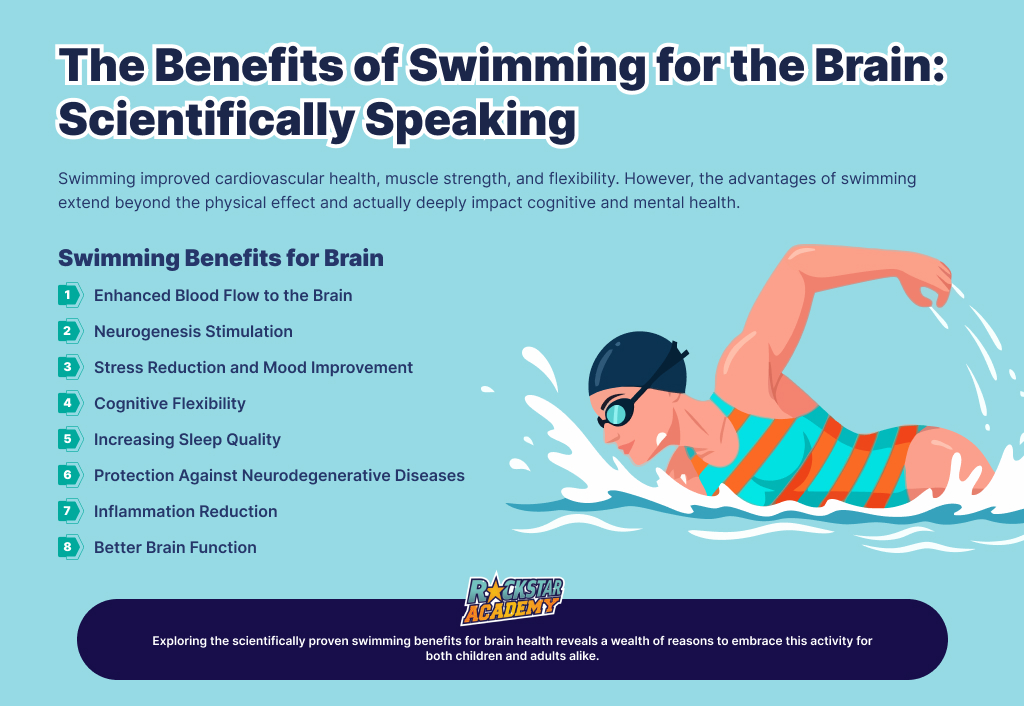The Benefits of Swimming for the Brain: Scientifically Speaking

Swimming improved cardiovascular health, muscle strength, and flexibility. However, the advantages of swimming extend beyond the physical effect and actually deeply impact cognitive and mental health.
This article delves into the scientifically backed reasons why swimming benefits the brain, highlighting research and studies that elucidate this connection.
8 Swimming Benefits for Brain
Swimming has so many benefits especially for the brain. Let's explore eight key benefits of swimming for brain health, supported by scientific research and journal findings:
1. Enhanced Blood Flow to the Brain
Swimming is a form of aerobic exercise, and like all aerobic activities, it increases blood flow to the brain. Enhanced blood flow ensures that the brain receives an adequate supply of oxygen and nutrients, which are essential for its optimal functioning.
A study mentioned that regular aerobic exercise, such as swimming, increases the production of brain-derived neurotrophic factor (BDNF), a protein that promotes the survival of nerve cells and plays a crucial role in learning and memory. [the Journal of Physiology, 2016]
2. Neurogenesis Stimulation
Neurogenesis is the process of generating new neurons in the brain. Swimming has been shown to stimulate neurogenesis, particularly in the hippocampus which is a brain region associated with memory and learning.
Research demonstrated that swimming significantly increased hippocampal neurogenesis in adult mice. The hippocampus plays a vital role in forming, organizing, and storing memories. Enhancing neurogenesis in this area suggests that swimming can improve learning and memory capabilities. [Evid Based Complement Alternat Med, 2014]
3. Stress Reduction and Mood Improvement
Swimming also impacts the brain by reducing stress and improving mood. Exercise, in general, triggers the release of endorphins. It is chemicals in the brain that act as natural painkillers and mood elevators.
A study also found that swimming can significantly reduce stress-related hormones like cortisol and increase levels of serotonin, a neurotransmitter associated with mood regulation. This reduction in stress and elevation in mood can improve overall brain health and cognitive function. [Int J Environ Res Public Health, 2020]
4. Cognitive Flexibility
Cognitive flexibility is another ability where swimming shows benefits. Research indicates that regular physical activity, including swimming, can improve executive functions such as cognitive flexibility, working memory, and attention. These functions are crucial for problem-solving, planning, and multitasking. [Frontiers in Aging Neuroscience, 2020]
5. Increasing Sleep Quality
Good sleep is essential for brain health, and swimming can contribute to better sleep quality. According to a study in the Sleep Medicine Reviews, swimming can help regulate sleep patterns and improve the quality of sleep. [Front Psychol, 2022]
Improved sleep enhances cognitive functions such as memory consolidation, decision-making, and emotional regulation.
6. Protection Against Neurodegenerative Diseases
Swimming may also offer protective benefits against neurodegenerative diseases like Alzheimer's and Parkinson's.
Research in the Journal of Alzheimer's Disease suggests that aerobic exercise, including swimming, can reduce the risk of developing Alzheimer's disease by promoting cardiovascular health and reducing inflammation. [J Sports Sci Med, 2005]
Additionally, swimming can enhance the release of neurotrophic factors that protect the brain from degeneration.
7. Inflammation Reduction
Chronic inflammation is linked to various neurodegenerative conditions. Swimming helps reduce inflammation in the body, including the brain.
A study published showed that swimming can lower levels of inflammatory markers in the blood. This anti-inflammatory effect is crucial for maintaining brain health and preventing cognitive decline. [Brain, Behavior, and Immunity, 2017]
8. Better Brain Function
It's well-known that physical activity can help maintain mental sharpness as you age, but swimming has also been shown to benefit children's brain development. Here are several swimming benefits for brain you should know about:
- Older Swimmers: Research on older adults revealed that swimmers exhibited superior cognitive abilities compared to non-swimmers. [International Journal of Clinical and Experimental Physiology, 2019]
- Cognitive Function: A comparable study on young adults found similar outcomes. Even just 20 minutes of breaststroke swimming was shown to enhance cognitive function in children. [Wiley and American Physiological Society and The Physiological Society, 2019]
- Cognitive Milestones: A study conducted by Griffith University in Australia discovered that children who start swimming at a younger age achieve cognitive milestones up to 10 months earlier than their non-swimming peers. [Griffith University, 2013]
All these brain benefits are impressive, but ultimately, swimming also makes you feel happier, more focused, and less stressed. It's hard to find something better than that!
Ready to Swim?
Exploring the scientifically proven swimming benefits for brain health reveals a wealth of reasons to embrace this activity for both children and adults alike. If you're looking to enhance your child's swimming skills, including breath control, consider enrolling them in the comprehensive swimming program at Rockstar Academy.
Our program offers a range of classes, from beginner Mom & Me sessions to advanced training, ensuring a solid foundation in water safety, swimming techniques, and overall fitness.
Moreover, students have the opportunity to participate in prestigious events like the Elite Championships and RockOlympics, fostering personal growth and competitive spirit.
Experience the transformative power of swimming by signing up for a free trial class today and discover the lifelong benefits it offers for physical, mental, and competitive development.

FAQ
How often should I swim to see cognitive benefits?
To reap the cognitive benefits of swimming, it is recommended to swim at least three times a week for 30 minutes per session.
Can swimming help with mental clarity and focus?
Yes, swimming can improve mental clarity and focus. The increased blood flow to the brain and the release of neurotrophic factors enhance cognitive functions such as attention, memory, and problem-solving skills.
Is swimming better than other forms of exercise for brain health?
While all forms of aerobic exercise benefit the brain, swimming has unique advantages due to its low-impact nature and the meditative state it can induce. This makes it particularly effective for reducing stress and improving mood, which are crucial for cognitive health.
Can children benefit from swimming in terms of brain development?
Absolutely. Swimming can enhance cognitive development in children by promoting neurogenesis and improving executive functions. It also helps in developing social skills and emotional regulation through group activities and structured classes.
Are there any risks associated with swimming for brain health?
Swimming is generally safe and beneficial for brain health. However, it is important to ensure proper technique and safety measures to prevent injuries. Consulting with a healthcare provider before starting any new exercise regimen is advisable, especially for individuals with pre-existing health conditions.



